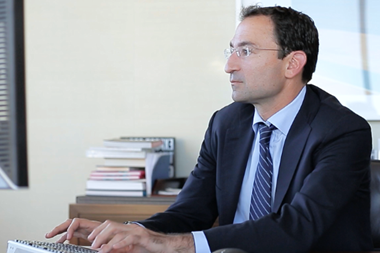Richard Moffitt, CEO of Urban Logistics REIT, a FTSE 250-listed investment trust specialising in logistics real estate, speaks to Montfort’s Andrew Teacher about the long-term positive outlook for sheds, why the REIT structure has worked for his business, and why real estate professionals can’t always manage complex operations sitting at a desk.
LISTEN to this podcast via Apple, Amazon, Spotify or SoundCloud (and many other platforms) or just use the player below:
Many may recognise Urban Logistics REIT from its inventive ticker on the London Stock Exchange – SHED – but as the company’s CEO Richard Moffitt explains, the development and operation of a logistics warehouse is much more complicated than a garden structure where former Prime Ministers write their memoirs.
Remembering back to when he first started the business in 2016, “people just bought whatever was available that would call itself a shed”, Moffitt says.
“They overlooked the important things like the loading provision the yard circulation space. The building specification was really important to us, because we’d seen in previous downturns that buildings just will not let if they’re substandard.”
‘Sheds’ are a byword for logistics real estate, one of the most lucrative corners of the market and one that has seen significant growth since the pandemic underlined the dire importance of supply chains.
And the publicly listed REIT structure continues to work well for the firm.
“We’ve collected over 99% of our rents every year since IPO,” Moffitt remarks, “so proof of the pudding is clearly in the eating – and by collecting those rents we’re demonstrating to our shareholders that we take good credit.”
The logistics market may be cooling from its frothy post-pandemic highs, but it is still underpinned by solid structural drivers.
“We still expect companies to need space to keep modernising from an ESG perspective,” Moffitt argues. “They need to be in modern fit-for-purpose buildings. But also I think there’s still a structural shift to online that’s going on, and there are so many companies out there that still need to fulfill that last mile distribution need.”
An aspect of working in real estate that hasn’t changed for Moffitt over his more than 25 years’ experience is his need to get hands-on.
“What I love about real estate more than anything else is getting out and looking at how businesses are trying to ship goods around the UK,” Moffitt explains. “That’s never changed for me. People think you can own and manage real estate from a desk in London, but ultimately the best performance is going to come from getting close to your occupiers and understanding what they do.”
In terms of how the market is changing, Moffitt doesn’t think that large multinational corporations have as much of an advantage any longer.
“The larger firms have had the advantage over the last 20 years or so,” he notes, “through logistics becoming a global investment market – or at least global capital looking to enter the UK to invest in logistics. Therefore the bigger firms with global reach clearly had a better tap into that market.”
“That’s changed now,” he continues, “anyone from a niche or a big firm can pick up the phone to sovereign wealth fund or a private equity house. It’s all about the individual, the connections, and the knowledge.”
LISTEN to this podcast via Apple, Amazon, Spotify or SoundCloud (and many other platforms) or just use the player above.































No comments yet